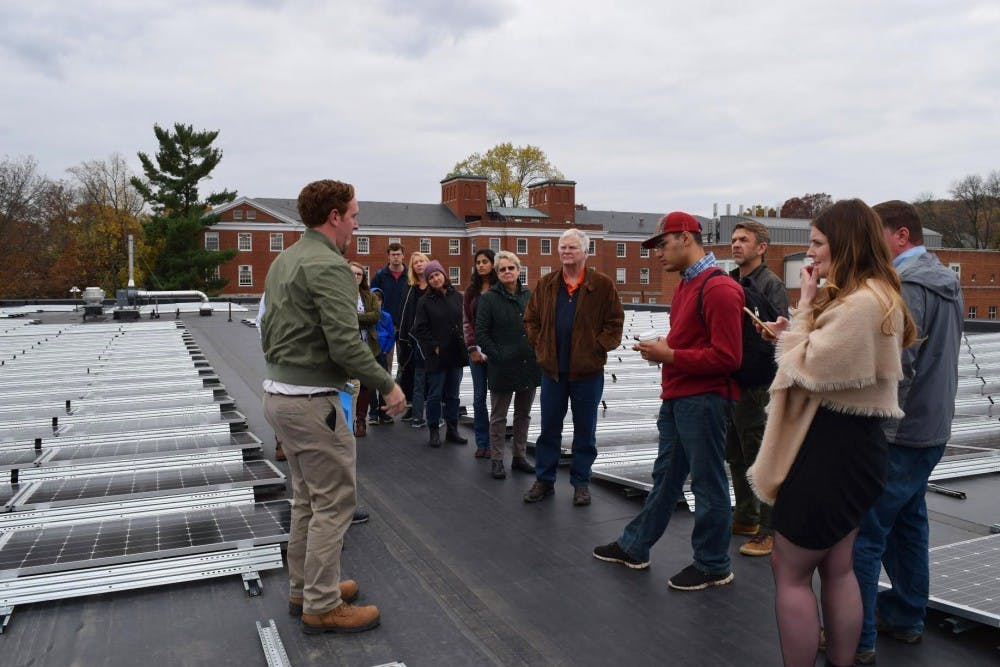Wahoos for Sustainability — an organization dedicated to lowering the University’s carbon footprint — launched a petition on Sept. 4 calling on the University to set a goal for achieving carbon neutrality by 2035 . The petition has garnered nearly 1,200 signatures so far from students, faculty and alumni.
Wahoos for Sustainability was founded in 2016 by three alumni to support the goal the University had already established to reduce greenhouse gases by 25 percent of 2009 levels by the year 2025. According to its website, the independent organization is comprised of “alumni, students, faculty and staff.”
“The University is really approaching a fork in the road in terms of its next goal,” said Grey McLean, a Class of 1995 alumnus and founding member of Wahoos for Sustainability. “And so I think that Wahoos [for Sustainability] really believes that the University should make sustainability a core strategic goal in the University, not only in teaching and research but also in practice.”
Wahoos for Sustainability is not formally affiliated with any student-run groups or the University itself. Abigail Heher, a third-year College student and chair of the Student Council Sustainability committee said in an email to The Cavalier Daily that beyond forwarding the petition to student groups, Student Council was not very involved in its development. The committee is currently focusing on working with organizations such as Pancakes for Parkinson's to make their events “zero waste,” which would, in turn, would lower the University’s carbon emissions during waste processing.
According to a U.Va. Sustainability Zero Waste Event Guide, “a zero waste event is one in which organizers emphasize reusable, recyclable, or compostable materials in order to minimize land-fill-bound waste from the event.” Recommendations in the guide include eliminating single-use items, such as condiment packets, and non-compostable materials, such as plastic coffee stirrers.
Heher supports the goal set out by the carbon neutrality petition, and said that Student Council is looking for ways to show support for the University’s goals in sustainability. On Oct. 23, Student Council, in an effort led by Heher, passed a formal resolution supporting the Carbon Neutrality by 2035 goal.
Although Wahoos for Sustainability is also independent from the University and U.Va. Sustainability, McLean serves as his organization’s representative on the Committee for Sustainability in the Office of Sustainability.
“We anticipate meeting our 2025 goal ahead of schedule, and because of that and the urgency of climate action, we are already looking towards our next target,” said Cheryl Gomez and Andrea Trimble, representatives from the Facilities Management Sustainability Office, in an email to The Cavalier Daily.
Gomez and Trimble note that the University’s involvement in two solar energy projects, “U.Va. Hollyfield” and “U.Va. Puller” have been instrumental in helping meet their 2025 energy goal. U.Va. Hollyfield is a 160-acre solar facility in King William County, and U.Va. Puller is a 120-acre solar farm in Middlesex County.
According to University’s Annual Sustainability Report for last year, there was a nearly 19 percent reduction in greenhouse emissions when comparing 2017 to 2009 levels, as well as solar panel installation on the roofs of Clemons Library, Ivy Stacks, Ruffner Hall, the University Bookstore and Skipwith Hall.
The University is also planning to purchase the output of two solar power projects in 2019 that will neutralize 21 percent of the University’s electricity usage.
While recognizing these actions, Wahoos for Sustainability challenges the University to take on a “bold, yet achievable” goal of complete carbon neutrality by 2035. The organization argues that the falling costs of renewable energy point to the affordability of the plan.
“There's certainly lots of examples of other Universities who have implemented very cost effective solutions that have saved their university and colleges actually a lot of money over time,” McLean said.
Additionally, McLean said that in order for the University to remain a leader in sustainability among its peers, it should establish an aggressive carbon neutrality date. Other institutions that have adopted plans to curb carbon emissions include Arizona State University — whose plan is to eliminate greenhouse gas emission from all energy sources by 2035 — and Harvard University — whose plan is to be fossil fuel neutral by 2026.
The University’s upcoming Bicentennial Sustainability Leadership Summit will present the University’s current projects, research and teaching related to topics in sustainability.
“A stated goal of the Summit is to envision a shared vision for UVA Sustainability that is inclusive of the voices of our faculty, staff, students, alumni and community,” Gomez and Trimble said.
The Summit will take place Oct. 28 through Oct. 30 and all events are open to the public and require pre-registration.
Correction: This article previously misstated that the carbon neutrality petition launched on April 22. The petition was actually launched on Sept. 4. The article has been updated to reflect this date.
This article has also been updated with information about a resolution passed by Student Council on Oct. 23.







